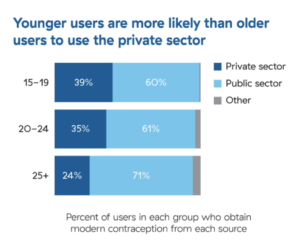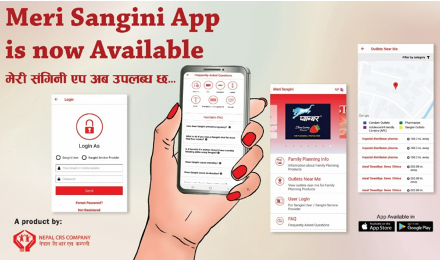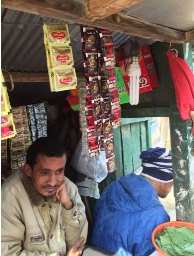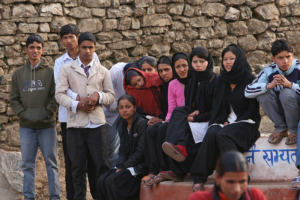Nepal CRS Company: Pioneering Social Marketing of FP Commodities in Nepal
The private sector in Nepal is an important source of short-acting reversible contraceptives. It represents a critical opportunity to increase contraceptive access and choice. The Government of Nepal (GON) has emphasized the importance of strengthening social marketing and the private sector (National Family Planning Costed Implementation Plan 2015–2020). Nepal CRS Company (CRS) has introduced family planning (FP) commodities and services in the country for almost 50 years. Recent innovations in social marketing, through the use of marketing methods, intend to bring about social and behavioral change to improve citizens’ quality of life.
Increasing Private Sector Preference by Consumers

Click here for an accessible version of this image.
Over the years, the private sector as a source of contraception has increased as social marketing flourished and contraceptive choices expanded. Specifically, private-sector contribution to modern contraceptives has increased from 7% in 2001 to 19% in 2016 according to the Nepal Demographic Health Surveys (NDHS).
From 1996 to 2016, the percentage of married women obtaining contraceptives through the private sector significantly increased from 26% to 40% for the pill, 2% to 24% for injectables, and 32% to 56% for condoms. In addition, younger users and married adolescents are more likely to use the private sector to access contraceptive methods.
Given that the GON currently provides all contraceptive methods free of cost from public health facilities and the sale of contraceptive products through private-sector facilities has increased rapidly over the years, opportunities exist for graduating short-term contraceptive users (condoms, pills, injectable) from public health facilities to private-sector facilities. This diversion of resources could help address the needs of the long-acting method users and specific population/geographic segments through the public sector.
Pioneering FP-Commodity Social Marketing in Nepal.

Nepal CRS Company has been providing Jadelle, a two-rod implant, since 2008.
Nepal CRS Company (CRS) has introduced contraceptive products and services in the country since 1978. Currently, CRS’ contraceptive product portfolio comprises multiple brands:
- Four brands of condoms.
- Two brands of oral contraceptive pills.
- Injectable.
- IUCD.
- Implant (Jadelle).
- Emergency contraceptive.
The products target consumers at different wealth levels and geographic areas. The approach has proven effective. The social marketing campaigns—reinforced by quality products and extensive product advertisements—have established a strong brand portfolio. Many CRS brands have become synonymous with contraceptive products in Nepal. Market and consumer feedback on existing products are utilized to introduce product variants and revitalize the existing products.
CRS uses digital platforms (Facebook, YouTube, Twitter) for value addition to its products and services. These digital platforms provide:
- Additional information on product use. Frequently asked questions on each method.
- Location of service providers.
- Opportunity for users to send their queries to obtain further information on FP/RH.
Digital space is used for marketing efforts and to ensure the products’ accessibility. Social media platforms inform potential customers of the availability of new products, product schemes, and marketing campaigns. In addition, CRS created the Meri Sangini (“my close friend”) app, which makes information on each product readily accessible for users as well as service providers. Digital applications are also used to track the success of marketing campaigns and product stock levels at various distribution points.

CRS has created an extensive social franchising network, called the Sangini franchise network, for the distribution of its products by working with private medical and non-medical product distributors. The Sangini-affiliated providers are trained in providing the injectable (Sangini).
CRS started this network in 1994 through 50 private medical providers in Kathmandu valley. As of 2021, the Sangini network has grown to 2,300 outlets across the nation. It is thought to be the first of its kind in the world to provide the clinical three-monthly injectable contraceptive “Sangini” (Depot Medroxyprogesterone Acetate—DMPA) through a network of private medical outlets.
The Sangini network fulfills around 25% of the demand for injectables in the country and is the only major source of DMPA through the private sector. The availability of a full range of short-acting FP methods and trained providers, the availability of the service provider-administered injectable, the visibility of the outlets, and the ability of these outlets to maintain clients’ privacy have made these outlets popular among clients.

A nontraditional outlet.
CRS products are available in all 77 districts and in remote parts of the country. More than 21,000 traditional outlets (TOs)—such as pharmacies and medical shops—across the country carry both hormonal and non-hormonal CRS contraceptive products. Additionally, more than 20,000 non-traditional outlets—such as cold stores that sell cold drinks, beetel (Paan) shops, and groceries shops—carry non-hormonal contraceptives (condoms) and other CRS health products.
CRS also has its own warehouse where products are repacked and dispatched to distribution networks throughout the country. Thirty-three distributors stock a minimum of three months’ supply and distribute them to their wholesalers and retailers. CRS has complemented the government’s FP program by promoting the subsidized sale of contraceptives through CRS retail outlets across the nation. USAID and the KfW Development Bank have been instrumental in enabling CRS to reach remote outlets in the country. Both USAID and KfW supported CRS by providing vehicles to supply goods to outlets where the private-sector distribution network found it unprofitable to do so.
Challenges
Despite the immense growth in private sector preferences by consumers, CRS and others working in family planning in Nepal face challenges.
Lack of Domestic Manufacturing
Nepal doesn’t manufacture contraceptive products domestically. CRS, along with the country, is dependent on other countries for contraceptive products. The procurement process, along with shipping can lead to delays in timely product supplies in the market.
Difficulty Reaching Young Couples

Credit: Simone D. McCourtie/World Bank.
The use of contraceptives, especially among adolescents, remains very low though the knowledge of contraceptive methods is nearly universal in Nepal. Only 15% of currently married women aged 15–19 use modern contraception methods whereas 24% by the age group of 20–24 (NDHS 2016). The median age at first marriage is 17.9 years among women and 21.7 years among men aged 25–49 (NDHS 2016). Several barriers greatly affect the likelihood of a married adolescent seeking FP services at the health center: low-grade quality of care, poor infrastructure, lack of separate space, confidentiality, and privacy issues, lack of or substandard quality training of health workers in providing service, health worker’s workload and availability, and the center’s opening hours.
Natural Disasters
Nepal is prone to natural disasters due to its geographic characteristics which add to the difficulty of getting products to the areas of need in a timely manner. Landslides and floods are annual occurrences with risks increasing due to climate change. There is also the potential for major earthquakes following the 2015 earthquake.
Takeaways and Insights
Private-Sector Benefits
The private sector increases the choice and access to good quality contraceptives and can play a significant role in providing short-acting reversible contraceptives. Meeting the diverse needs of various population segments equitably will require increased coordination and collaboration among the public sector, nongovernmental organization (NGO) sector, and commercial/private sector. However, there needs to be a purposeful, constructive, and collaborative working relationship between the public and private sectors.
Opportunities exist for social marketing to expand the role of the private sector for populations in upper wealth quintiles, many of whom are currently relying on public resources. This strategy could foster a more efficient market in which the private sector helps reach those segments of the population with the ability to pay, leaving public resources for increasing access and choice among the country’s poorest.
Strengthening private health care providers’ clinical, business, and counseling skills in providing newer methods, and ensuring uninterrupted supplies of FP commodities has expanded the basket of methods available in the private sector and the adoption of modern contraceptive methods. The private sector, especially through social marketing, can help the public sector scale up innovative and new FP methods. One such example is the possibility of scaling up the self-administered injectable, Sayana Press, through the Sangini Network.
Public-Sector Reforms
The public sector should formulate strategies and policies to encourage the private sector for in-country production of contraceptives. Government procurement strategies need to include the private sector in its supply chain. Policy changes are needed to strengthen private health care providers’ clinical, business, and counseling skills, quality of care certification by meeting set standards, and ability to provide new contraceptive methods.
National family planning policies or contraceptive policies should clearly define the role of the private sector to foster greater partnerships with the private sector. Policy reforms to allow convenient over-the-counter availability of contraceptives (such as condoms, oral contraceptive pills (OCP), and emergency contraceptive pills (ECP)) provide an opportunity for private providers to procure and sell contraceptives. Easing the process of import licensing, social franchising, social marketing, and authorizing contraceptive sales, especially hormonal contraceptives through pharmacies (drug shops), will motivate the private sector to invest and increase access to contraceptives.
Recommendations
The private sector can work hand in hand with the public sector to extend the reach of and choices of contraceptives. The increasing market share of the private sector and preferences of the younger generation for private-sector products are opportunities that must be taken advantage of. Social marketing of contraceptives can build on its successes and support social change and behavior change to improve people’s quality of life by increasing contraceptive use.




